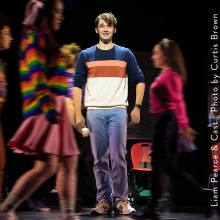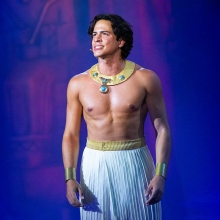
Full Synopsis
Renascence begins when six actors gather to try and write a poem. Once they complete the first stanza, they are confident they can go the distance ("Travel"). Whose poem will it be? The Editor chooses the actress playing Edna St. Vincent Millay, a.k.a. Vincent.
Vincent celebrates her 18th birthday with her younger sisters, Norma and Kathleen, and her doting Mother. Mother tells Vincent about a nationwide poetry contest offering a prize of $1,000, which, to this impoverished family in 1912 Maine, is a fortune. Father-who abandoned the family years before but communicates with Vincent psychically-cautions her not to be so sure she'll win, but Mother's belief in Vincent overcomes Father's uncertainty ("The Beanstalk").
Midway through writing her poem, Vincent gets stuck. She and her sisters recall Father's many promises to send money and visit them, none of which he's done. Vincent marvels at Mother's strength to end a marriage that wasn't working and become sole provider for her girls. Vincent imagines Mother's emotional state the day she threw Father out ("Lament"). Vincent misses Father and he misses her-or Vincent imagines that he does ("Alms").
Vincent is still blocked. Mother is away working, and Norma and Kathleen do all the housework so Vincent can write. This is the closest the three of them will ever be ("Afternoon on a Hill"). Norma gets an idea that inspires Vincent to finish her poem, which Kathleen titles "Renascence."
Vincent's poem is accepted as a finalist in the competition. Kathleen suggests she write the Editor a flirtatious letter to ensure she wins first prize ("What Lips My Lips Have Kissed"). An unmarried matron, Caroline B. Dow, hears Vincent recite her poem, and offers to help Vincent gain admission to, and pay for, Vassar College ("I Shall Forget You Presently, My Dear").
Father and Mother also communicate psychically, and Father knows something Vincent doesn't: Mother is also a poet. She, too, has submitted poems to this contest-and been rejected. Father intuits that Mother's endless support for Vincent's talent and ambition takes a huge toll on Mother ("The Ballad of the Harp-Weaver").
The prizes are announced, and Vincent does not win, a crushing blow: she, her sisters and Mother were counting on the prize money to survive. Mother, Norma and Kathleen do a deep dive into resentment. But to Vincent, Father suggests an alternative: use her gift to transform her rage and disappointment into poetry ("Blight").
Critics around the country praise "Renascence" and lambaste the judges for not awarding it first prize. Vincent is a cause célèbre and, thanks to Caroline B. Dow's efforts, she gets into Vassar. But Vincent is unhappy there. She is now famous, worshipped as a poet goddess by her classmates in a way that leaves her lonely-until she meets Elaine Ralli, who is grounded, sensual and wealthy. Vincent and Elaine visit Elaine's family's many homes, and Vincent takes Elaine to her childhood home to show her what poverty looks like. They fall in love ("Recuerdo"). But Caroline B. Dow, still involved in Vincent's life, makes Vincent see that an openly lesbian relationship could destroy Vincent's career. With a heavy heart, Vincent devastates Elaine by dropping her ("Elegy").
Vincent visits New York City to meet with a publisher about publishing a collection of her poems. Vincent and her publisher share a hedonistic streak that involves men, women, whatever feels good ("First Fig/The Penitent"). Caroline B. Dow is horrified by Vincent's behavior, but Vincent no longer needs her. When Vincent drops her, Caroline B. Dow is shattered ("When the Year Grows Old").
Back in Maine, Mother, Norma and Kathleen are feeling neglected. Vincent supports them financially, but never sees them. Unbeknownst to them, Vincent feels isolated in her life as a celebrity. The four them reconnect in their imaginations, the three sisters carefree as they were when they were children, much to Mother's delight ("Exiled"). When the moment ends, they are back in their lonely lives.
Father shows up at one of Vincent's public appearances, the first time she's seen him in fifteen years. He is nothing like the man she's been imagining-and he is destitute. Vincent is torn between anger and a need to connect. She yearns for Father to apologize, but he doesn't… he can't. Watching him stagger away, Vincent realizes that there are reasons Mother threw him out. Still, she misses him terribly and always will ("Time Does Not Bring Relief").
How to fill the hole in her heart left by his absence? How to live with her need to connect to those she loves, and her inability to do so? Says Mother, "More than a poem, 'Renascence' is an answer to all the questions you didn't have when you wrote it." And the world cracks open: from an environment of deprivation and austerity, the actors are thrust into limitlessness of an artist's imagination, bright like a child's playroom but formalized in a way that invites ritual ("The Procession"). This is where creativity meets spirituality, and in this space the actors perform the title poem to come to grips with their own souls and complete the journey they commenced when they came together in search of a poem ("Renascence").
Connect
Billing
- Book by
- Music by
- Lyrics by
Requirements
Video Warning
In accordance with the Performance License, you MUST include the following warning in all programs and in a pre-show announcement:ANY VIDEO AND/OR AUDIO RECORDING OF THIS PRODUCTION IS STRICTLY PROHIBITED.
Included Materials
| Item | Quantity Included |
|---|---|
| LIBRETTO/VOCAL BOOK | 10 |
| PIANO CONDUCTOR'S SCORE | 2 |
| PIANO VOCAL SCORE | 2 |
Production Resources
| Resource |
|---|
| HOW DOES THE SHOW GO ON? |
| LOGO PACK DIGITAL |
| PRODUCTIONPRO-DIGITAL SCRIPT/SCORE |
| REFERENCE RECORDING |
| STAGE MANAGER SCRIPT |
| STAGE WRITE APPLICATION |
| TRANSPOSITIONS-ON-DEMAND |
| VIRTUAL STAGE MANAGER |
STANDARD ORCHESTRATION
| Instrumentation | Doubling |
|---|---|
| BASS | |
| CELLO | |
| HARP | |
| HORN | |
| KEYBOARD 2 | |
| REED 1 | |
| VIOLIN |




